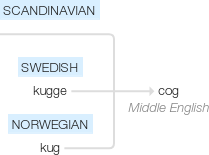Cog
Middle English: probably of Scandinavian origin and related to Swedish kugge and Norwegian kug .
wiktionary
From Middle English cogge, from Old Norse[Term?] (compare Norwegian kugg(“cog”), Swedish kugg, kugge(“cog, tooth”)), from Proto-Germanic *kuggō (compare Dutch kogge(“cogboat”), German Kock), from Proto-Indo-European *gugā(“hump, ball”) (compare Lithuanian gugà(“pommel, hump, hill”)), from *gēw-(“to bend, arch”).
The meaning of “cog” in carpentry derives from association with a tooth on a cogwheel.
From Middle English cogge, from Middle Dutch kogge, cogghe (modern kogge), from Proto-Germanic *kuggō (compare German Kock(“cogboat”), Norwegian kugg(“cog (gear tooth)”)), from Proto-Indo-European *gugā(“hump, ball”) (compare Lithuanian gugà(“pommel, hump, hill”)), from *gēw-(“to bend, arch”). See etymology 1 above.
Uncertain origin. Both verb and noun appear first in 1532.
cog (plural cogs)
etymonline
cog (n.)
c. 1300, "wheel having teeth or cogs;" late 14c., "tooth on a wheel," probably a borrowing from a Scandinavian language (compare Norwegian kugg "cog") and cognate with Middle High German kugel "ball."
